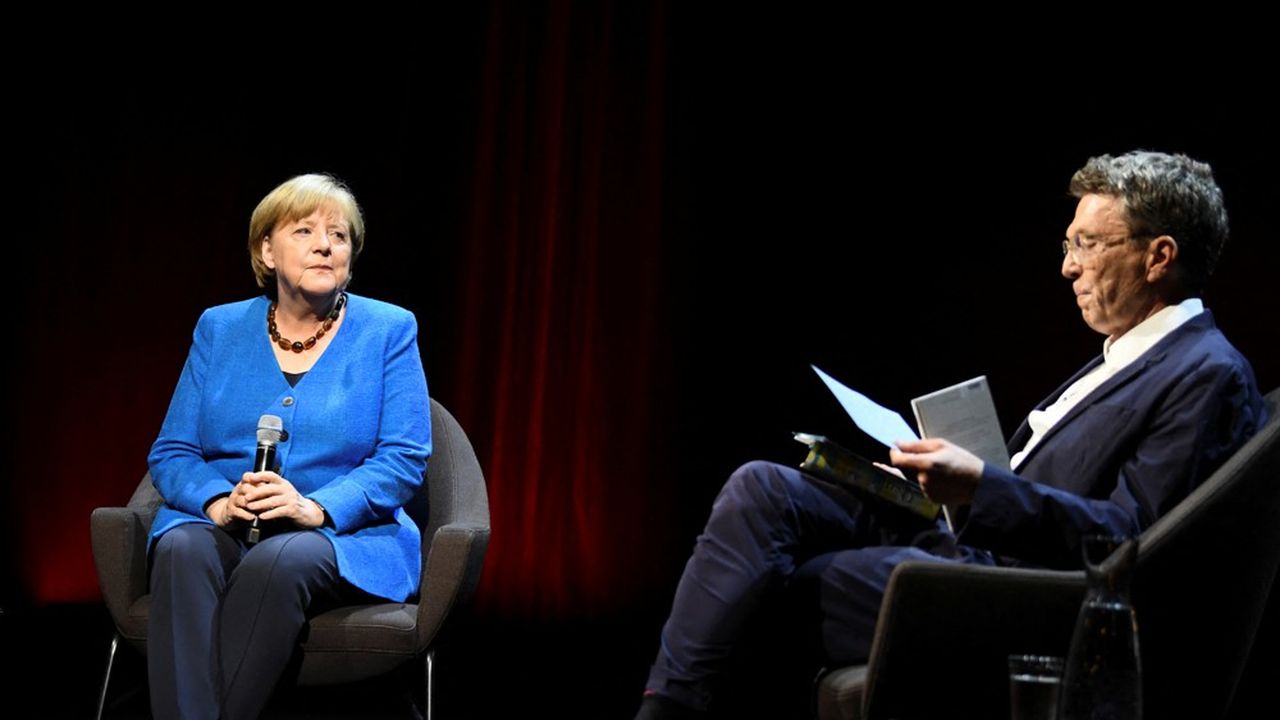Angela Merkel imagined the end of her mandate differently. The war against Ukraine unleashed by Vladimir Putin constitutes “a brutal raid in violation of international law, for which there is no excuse”, condemned the former chancellor on Tuesday evening in Berlin. Could she have avoided such a tragedy by being less flowing with the Russian president? Angela Merkel wonders but “I do not blame myself”, she assures. “Diplomacy, if it fails, is not a bad thing,” she defends.
This first interview of ninety minutes was eagerly awaited as the Chancellor had so far held back from the news. Led at the Berliner Ensemble by the journalist of the “Spiegel” Alexander Osang, who has followed her for more than twenty years, the exchange aimed to “confront Angela Merkel with the difficult questions of our time”. Above all, her friendly tone gave the former Chancellor all the time, attentive but determined, to sweep away any criticism in the face of an audience under the spell of her appearance.
“I will not apologize”
Angela Merkel acknowledges having failed to create, on the Old Continent, “a security architecture that could have prevented this war”. However, she assures us that the war would have broken out much earlier without the Minsk agreement signed in 2015. A green light in 2008 for a process of Ukraine’s accession to NATO, which she had a war even earlier. “I wanted to avoid an escalation,” she hammered. And to remember that the Ukrainian regime was corrupt at the time. “I don’t see the need to say it was a mistake, so I won’t apologize,” she concluded.
Angela Merkel also swept away any naivety. She denies having believed that she could bring Vladimir Putin to his senses thanks to the development of commercial links, stressing that the Russian president did not wait for the Nord Stream 2 gas pipeline to be operational to attack kyiv. Knowing the convictions of the Russian president, the former chancellor claims to have tried to “find a modus vivendi to coexist” with Moscow. Even if relations with the Russian president deteriorated considerably after the annexation of Crimea in 2014. “It was already a deep rupture,” she acknowledged.
A smooth return
Shouldn’t the consequences have been drawn by investing more in the German army? The former Chancellor recognized “a need to catch up” but she was not afraid to defend “the good reputation of the German army” with her allies, and blamed her under-equipment on the social camp. -democrats. Angela Merkel recalled in particular that it was they who opposed the acquisition of armed drones. His party was also the only one to include in its program the target of 2% of GDP for military spending set by NATO.
However, she assured that she had full confidence in the government of Olaf Scholz in terms of foreign policy. “Voluntarily retiring as Chancellor is a nice feeling. Personally, I’m doing very well,” she said, happy to have been able to spend five weeks on the shores of the Baltic Sea, reading and walking without, to her surprise, getting bored.
The former chancellor, however, assured, with a smile and a sparkle in her eyes, that she did not want to “go to ground” forever. After sixteen years as chancellery, “I want to do something that I like,” she said. It remains to define what. But, a look at her watch, Angela Merkel can tell herself that her smooth return is under control.
–


